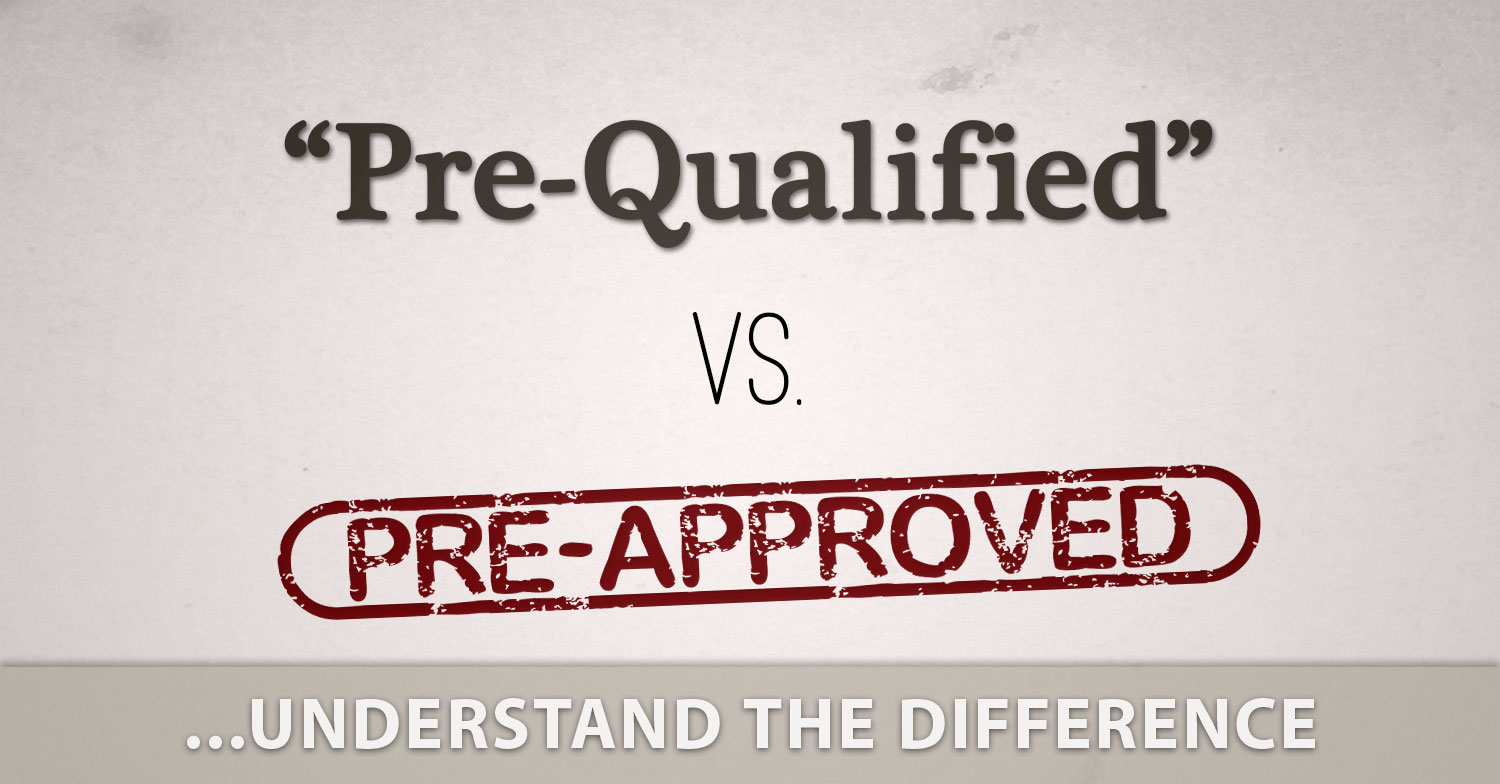Picking the right mortgage lender in Nebraska I am a local mortgage broker serving Omaha,…

Pre-Qualified vs Pre-Approved | Omaha NE Home Buyer’s Guide
What is the difference between Pre-Qualified and Pre-Approved?
A Pre-Qualification is a loan approval based on information the buyer has provided to their loan officer. A Pre-Approval is a loan approval based on a review of the buyer’s income, asset, and any other required documentation. It is important a buyer get fully pre-approved before making offers on potential homes.
We are a local mortgage broker serving Omaha, Papillion, La Vista, Bellevue, and all of eastern Nebraska. We can help you get fully pre-approved for financing so you can start shopping with confidence.
To get pre-qualifed and pre-approved start HERE
Getting Pre-Qualified is the important first step
A pre-qualification is when a buyer completes an application and usually includes a soft or hard pull on credit. This is the first step in the mortgage process. A buyer completes an application and gives their loan officer information about their employment history, income, assets, and any other information that may be needed. Additional information could be information about currently owned real estate, bankruptcies, tax liens, or child support/alimony payments.
With this information and a credit check, the mortgage loan officer can give the buyer a good idea of what they will qualify for and make recommendations on various loan programs.
Accuracy is important
The more accurate a potential buyer is on their initial application the more accurate a loan officer’s recommendations will be. A great start here will make the entire home financing process much smoother. Here are some tips to make sure you are giving correct information:
Employment history
Make sure to include the address, a good HR contact phone number, and your position on the app. It is important to put your exact start date on the application as well. If you have been at your current employer less than two years accuracy becomes even more important. For past employers make sure to include that address, phone, and position. More importantly include your exact start and end date. If there are gaps in employment in the last two years make sure to note those on the application. If you have two jobs make sure to tell your loan officer which is the primary and which is the part-time job so they can determine if the part-time income can be used. Part-time income has to have a two year history to qualify.
Income
This is super important and the area that often has the most errors. The application will have areas to separate out base pay, overtime, bonus, commission, etc. Make sure to fill these out as accurately as possible. Separate out your base from your other income. Commission, bonus, and overtime income is calculated differently than base income and it is possible not all of it can be used on the loan. When buyers lump all of their income into base income it can give wildly inaccurate income numbers.
If you are self-employed or paid primary in commission, it is best to provide your loan officer with two years complete tax returns so they can accurately determine income. When I qualify a self-employed buyer I will not issue a pre-qualification without tax returns. Self-employed income is complex and it is difficult for buyers to know the exact formulas we use to determine self-employed income.
Assets
This is another area that can cause issues with accuracy. It is important to list what is in your accounts at the time of application. Often buyers will put down what they plan to have in the account at the time of close. This will create an inaccurate income and can cause issues with your home purchase. If you are currently short the funds needed, put in the funds you currently have and explain when and how you will be receiving the rest of the cash needed for the loan. This will help the loan officer determine if and when you will fully qualify for the loan.
If you have had large deposits into your account in the last two months, make sure to let your loan officer know about these as well. Assets can only come from certain sources that approved by the loan type that will be used. For example, cash is not an approved source with any loan. If you put down that you have $10,000 in your account, but you just deposited $9,000 in cash, you only have $1000 in verified assets.
Other important information
I say this all the time “A mortgage is an audit of your credit, income, and assets”. Everything important to the loan financing will be discovered. There are some things that will only be discovered after you have found a home and we have an accepted offer. This can cause havoc with the loan approval and risk losing the house and the earnest deposit.
Child support and alimony are considered monthly debts and must be added to the debts when qualifying for a mortgage. Unfortunately, unless these items are disclosed by the buyer at the time of application, we will only know about them after title and underwriting have done their checks. Title and underwriting do not work on pre-qualifications or pre-approvals. They will only dig into a file after a contract has been received and the loan has started. If we do not know about child support or alimony ahead of time, we will find out a week or two into the loan and risk losing the approval.
Tax liens usually appear on a buyer’s credit report. A tax lien must be satisfied or in a payment plan to qualify for financing. If it is on a payment plan, that monthly obligation must be included in the buyer’s debt ratios. No sometimes tax liens do not report on credit, but they do appear on title. If you are making payments on a tax lien or have an active tax lien make sure to inform your loan officer at the time of application.
There is a spot on the application called “Declarations” where all of these can be acknowledged, but it is best to tell the loan officer about these in more detail after the application has been completed so they have all the information.
The pre-qualification is an important first step, but it is just the first step
Real estate is a strange industry. In certain markets it can often be a frantic race to get your offer in on a home as soon as possible before another buyer swoops in and takes it. If you find that dream house there can be a lot of pressure to just get an offer in before anyone else.
A good realtor will make sure that a buyer is fully pre-approved before they start showing houses. But just like some buyers, some realtors get a bit anxious and start making offers too soon. I cannot count the number of times I have received a call from an agent from the driveway of a home. They have an unapproved buyer that saw the house of their dreams and wants to make an offer. The buyer and the agent want an immediate pre-approval so they can get their offer submitted. This can create a nightmare. I cannot stress that enough. It can create a nightmare.
Don’t put the cart before the horse
If a buyer puts the cart before the horse and starts looking at homes before getting financing in place, it can create a lot of frustration. Loan officers want to provide accurate pre-approvals, but in the sometimes frantic world of real estate there can be pressure to issue a pre-approval letter too quickly. A buyer is eager to get their home and the agent is eager to help, but this is often where problems start. Issuing a pre-approval letter before documents are reviewed can cause issues when the application does not match the documentation. A buyer that is quickly filling out an application is more likely to give inaccurate information.
The best way to avoid pre-approval issues is to start with the home financing. Get that completely in place and then you can shop for a home with confidence. We can even call the seller’s agent to tell them that all of your documents are fully reviewed and are a solid buyer. That call can be the push the seller needs to pick your offer over other potential buyers.
Getting fully Pre-Approved is the important second step
We can get pretty far with an accurate Pre-Qualification. I can let you know rate, fees, loan program, and make suggestions on how to improve your situation if needed. But to get fully ready to make an offer on a home we need to review all your supporting documentation. We need to get you fully Pre-Approved. This complete review of your documents will allow us to verify the income and asset amounts you put on the application and catch any issues that might pop up during underwriting. The sooner we can review your documents the better your home buying experience will be.
Income documents
If you are a W2ed employee we will need to review your most recent pay stub and your most recent W2. Some loan programs will require two pay stubs and your most recent two years W2s. A pay stub will let us know exactly how your income breaks down and the W2s will give us a glimpse of your average income. However, if you are receiving bonus, commission, or overtime we may need further documentation.
Verification of Employment (VOE)
If you provide a HR contact, I can reach out to them to send over a Verification of Employment (VOE). This VOE will have a section to breakdown your average hours and commission, overtime, and bonus. If you do not receive a consistent 40 hours a week we will need to know your average hours to get an accurate base income. Your HR will have to complete this VOE form, sign, and send it back for review.
Self-employed
Documenting self-employed income will require a bit more digging. All loans will use a two year average of your adjusted gross income. Your adjusted gross income is your income or profit after all write offs. Where this gets tricky is there are some write offs that can be added back into income and there is some income that, though showing on your returns, cannot be used as qualifying income.
My team and I have gotten pretty good at reviewing tax returns, but the best course of action is to get the returns up to the person who is actually in charge of approving the loan – the underwriter. We can submit your returns to the actual underwriter and have them determine the income they will use. For our team this is the best course of action. The rules on self-employed income are almost a hundred pages long and it is better to know that we did not miss anything before you find a house.
Asset documentation
For your asset verification we will go back through 60 days of transactions. For your bank accounts this means we need two months complete bank statements. Today most people do not receive paper statements but you will have access to your bank statements online. Though most people view their transactions on an app or on a computer screen, we cannot use screenshots from your phone or computer. We will need all pages of your actual bank statements. All banks provide pdf forms of your monthly statements. Once you find these online it is pretty easy to email these over. Once we have these they will be reviewed for any large deposits. We are also looking for transfers from other accounts. If you are transferring money between accounts we will need two months statements for all of those accounts.
Gift funds
For certain loan programs you can use gift funds as assets. Who can gift you money will depend on the loan program, but for most it must be a family member. The donor will have to sign a form saying it is a gift, not a loan. This is important because loaned money cannot be used for the assets on a loan. For gift funds there are particular ways each loan program wants a donor’s funds documented so it is important to speak with your loan officer about gift funds during the pre-qualification phase.
Selling your current house for assets
If you are moving from one house to another and using the funds from the sale of your current home for assets, we just need to document that sale. This can all happen on the same day. You can sell your house and close on the new one at the same time. We will document the closing of your current home with your title company and transfer the funds over to the new home. It is easier than it sounds and we will work with your agent to document the current home’s contract and estimate of funds that will be received. I always recommend a buyer or seller work with a realtor on your transaction. Having a professional in your corner makes the whole process less stressful.
Other sources of assets
Every buyer is unique and can have a hundred different ways they plan to use assets on their home. The earlier you are upfront with the loan officer about your assets the sooner they can direct you on how best to get those assets sourced and documented.
Other documents that will be needed
Income and asset documentation are going to be required on every loan file. But there are many conditions that pop up for some buyers and not for others.
Child support
Child support and alimony, whether you are receiving or paying, will have to be documented with the court order and a history of payments.
Identification
Photo IDs will be needed at the start and end of the loan process. This is pretty easy, but it is important to remember that they cannot be expired. This is a part that gets overlooked and if you show up to the closing with an expired ID we cannot close.
Sale of personal items
The sale of personal items can also be used for funds at close. I included it here and not in the asset section because it is one of those situations that does not pop up often, but with any personal sale the most important thing is to not accept cash. We cannot use cash for assets. If you do plan to sell personal items for funds discuss this early with your loan officer so they can tell you exactly how to document it.
Start early!
The guideline book for conventional, FHA, and VA are each almost 1000 pages long. Every rule and requirement could not possibly be covered here. Because of this it is important to complete a full application early and go over the details with your loan officer before looking at homes. The more time we have to review your application and documentation the better the home buying experience will be.
The title of this article is a bit misleading. It is not pre-qualification vs pre-approval necessarily. We have to start with a pre-qualification before we get to your full pre-approval, but it is important to complete both as accurately as possible.
I’m sure everyone has heard stories about a home closing going badly or even falling a part at the last minute. Sometimes these things are out of everyone’s control (a bad home inspection or unreasonable sellers are just a few examples). But the majority of issues occur because the loan officer and buyers skipped the pre-approval process. I have been guilty of this myself. I have issued pre-qualification letters to buyers who were rushing to get their offer accepted. We find out later once I had the documentation the application was inaccurate. It is a situation no one wants to be in.
You may think it is too early to start the loan approval process, but I can tell you it rarely is. Even if you are not buying for a year, getting in touch with a loan officer early will improve your rate, the fees, and the loan process.
Other useful links
- How to improve your credit
- The 20% down rule on conventional
- What is Escrow?
- How is income calculated?
- Why your assets matter
- Mortgage Calculator
- Is Credit Karma accurate?
- FHA vs Conventional, which is better?
What To Do Next




